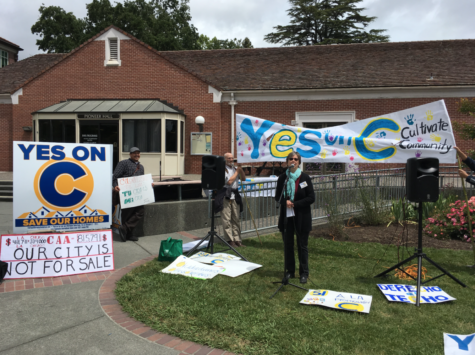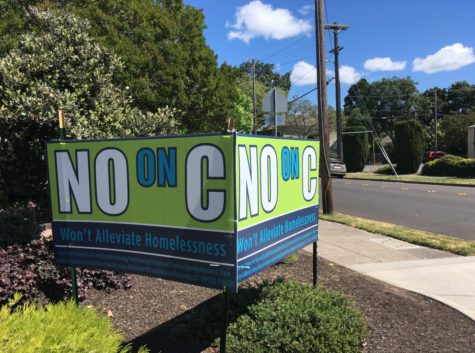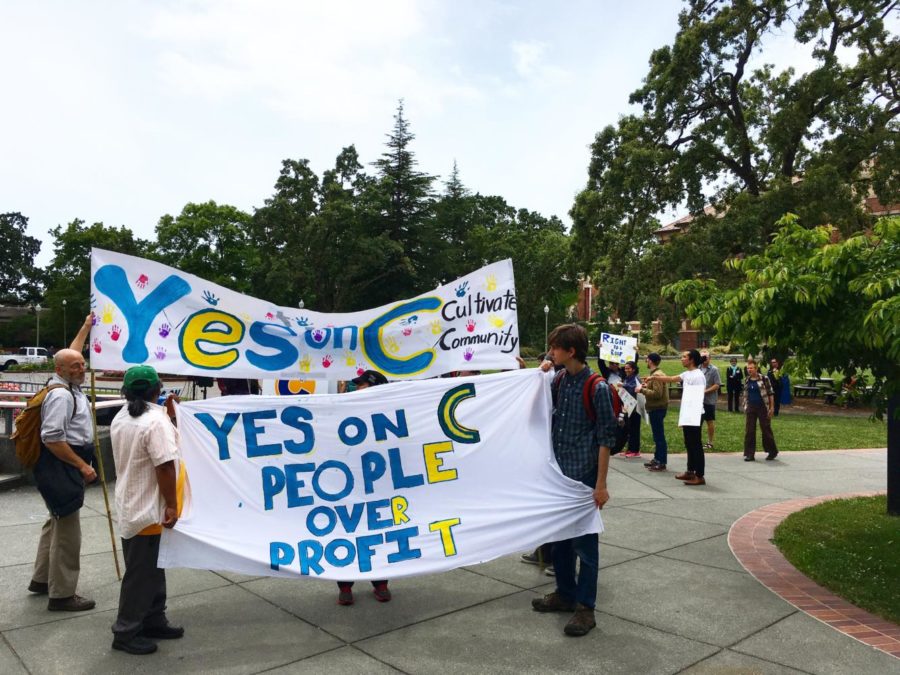The growing housing crisis is a hot topic in Santa Rosa these days. Rent control is on the Santa Rosa city ballot in a June 6 special election and voters will decide whether or not to pass Measure C, a 3 percent cap on annual rent increases for around 12,000 rental homes in the city built before 1995.
The measure will not apply to single family residences, condominiums, duplexes or triplexes where the owner lives in one of the units. Landlords will be imposed with an annual cost of more than $1 million for administration fees to uphold the measure.
Rent has increased around 20 percent in less than three years in Santa Rosa, and nearly half of all renter households in the city pay 30 percent or more of their income to housing costs, according to the U.S. Census Bureau. The vacancy rate in Santa Rosa is 1 percent and it is estimated to take seven years to receive Section 8 housing vouchers, a federal subsidy that helps low-income families afford rent.
In an ordinance passed and adopted by the Santa Rosa City Council, it is written that the rental increases are a threat to “public health, safety, and welfare of the city’s residents, including seniors, those on xed incomes, and those with other special needs, to the extent that such persons may be forced to choose between paying rent and providing food, clothes, and medical care for themselves and their families…”
Mark Malouf, Santa Rosa Junior College student and president of the SRJC College Democrats club, supports Measure C.
“We need to start ticking and tacking away the problem of housing in Santa Rosa,” he said. “Measure C is a step in the right direction to fix Santa Rosa’s complex issue. Capping the price of rent means that people can afford to stay in their homes.”

Dorothy Battenfeld, SRJC board of trustees member, speaks at the Yes on C rally at the Santa Rosa campus. The event was organized by the Yes on Measure C campaign together with the SRJC student government assembly and the SRJC sociology circle Tuesday, May 16. The rally was followed by a march from the quad to the Sonoma County Registrar of Voters to place “yes’ votes.
Fernanda Hernandez, SRJC student and volunteer for the No on C campaign, does not believe Measure C is the right way to go at all.
“If we want rent control in Santa Rosa, it should help everyone. Measure C would only help 18 percent of the people,” Hernandez said. “People who don’t qualify for it might see their rents skyrocket instead.”
Hernandez believes Santa Rosa should focus on the city’s homeless community and build more a affordable housing instead of passing Measure C.
“Money and effort should go toward everyone, not just the 18 percent of people who will be helped by this referendum,” she said. “We should build more apartments and more affordable housing for our community. It would benefit us all so much more.”
Although Malouf endorses Measure C, he does not believe it is a perfect solution.
“I don’t think it will solve all problems, but the way I see it is that your knee just got a bullet in it and you need to put a bandage over it, and that is what Measure C is,” he said. “The ultimate solution would be universal housing, but in the United States that is considered communism. I believe housing is a human right.”
One part of Measure C that Malouf specifically likes is a “just cause” eviction clause. It will prevent landlords from evicting tenants without a specified reason.
“Right now, people can get thrown out of their homes because they essentially have no due process. I met a tenant who was threatened with eviction because she did not accept the sexual advances of her landlord who tried to have sexual relations with her and her daughter,” Malouf said. “With Measure C, landlords need a legitimate reason to throw you out, like if you have a pet you are not supposed to have, or cooking meth in your kitchen.”
Hernandez takes no stand on the part of Measure C that provides a “just cause” for eviction. She has decided to focus completely on the rent control part of the measure instead.
“I don’t know much about the eviction part, my focus is helping everybody in the community to get affordable housing and Measure C will not provide that,” Hernandez said.

Signs either urging people of Santa Rosa to vote “yes” or “no” on Measure C are spread all over the city. The issue of rent control divides Santa Rosa.
Some common arguments from those who oppose Measure C are that the measure does not directly target affordable housing or homelessness. Some are also worried the measure will make it too hard for landlords to evict tenants who act outside the law.
Malouf is sceptic toward the No on C arguments.
“The No on C is a vast misinformation campaign to trick people to vote against their best self interest. That is why they [the No on C campaign] spend half a million dollars on flyers with crying babies and homeless people,” Malouf said. “They are not going to honest and say ‘landlords should be able to evict for no reason and there should not be a cap on rent increases’ because they know progressive voters live in Santa Rosa. That is how the right-wing rolls in California in order to win. They frame initiatives that are conservative as progressive. When I go knocking on doors, people with Bernie [Sanders] stickers on their cars are screaming to me ‘I don’t want your Yes on C bullshit, we’re voting no!’”
The No on C campaign is partly funded by rental housing providers and realtors, but Hernandez does not believe their support is based on fear of losing profits if a cap on rent increases is introduced, as argued by many supporters of Measure C.
“I don’t think that is their goal. I think they want to help the community because they live here too and they understand that what we need is affordable housing, not rent control,” Hernandez said. “It will only help one out of five; that is not equality. In America, we want equality for all. Measure C is bad for Santa Rosa. Many economic teachers argue it could damage our city.”
SRJC economics instructor Michelle Conley agrees that Measure C is problematic but does not go as far as saying it would damage Santa Rosa.
“Any step toward rental stability is a good step, but Measure C is poorly written,” Conley said. “It is presented as an affordable housing measure, but from an economic standpoint it does nothing to help those who need affordable housing.”
Conley believes one of the weaknesses of Measure C as it is written, is that it will benefit wealthy renters just as much as low-income renters.
“It should say that only people making under a certain amount can get these homes, but it does not address that at all,” Conley said. “It would be good if we were trying to pass a measure for low-income people.”
Conley is concerned that people in Santa Rosa will lose sight of other housing issues if Measure C is passed.
“We need not take a deeper look at Santa Rosa’s problem,” she said. “Measure C does not deal with homelessness and low-income people or the fact that people cannot afford to live here.”
Conley is the advisor for the SRJC Econ Club. During the semester, the club has looked further into the housing affordability issue in Sonoma County and released a non partisan study in occupation wage growth.
“Housing is a contentious issue, and there is a lot of fighting for affordable housing on campus,” said Sebastian Rodrigues, SRJC mathematics and economics student and one of the club’s lead researchers. “We have made an index for occupation wage growth to give people a better understanding when making informed decisions about whether or not to pursue a certain occupation in Sonoma County with the mindset to afford the median housing price here.”
The Econ Club hopes the report brings awareness to the relationship between wage growth and housing in Santa Rosa. It will be available in the SRJC Doyle Library by the fall.
Measure C is on the ballot during the special election in Santa Rosa June 6. It needs a simple majority of the votes to pass. Last day to register to vote is May 22.
For more information about the Yes on C, visit the campaign’s website at fairandaffordablesantarosa.com.
To know more about the No on C campaign, visit fairhousingforall.com.
https://www.facebook.com/oakleafnews/videos/1337749172988573/?pnref=story



